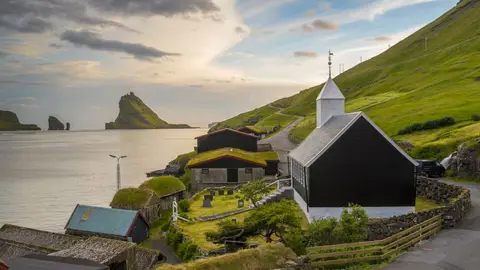How This Remote Danish Island Became an Unexpected Queer Destination

Behind the bar, a rainbow flag hangs alongside a Faroese flag. A sign on one of the tables reads, “Dealin’ kindness with everything in life.” Apple Twerk and Queen Bee cocktails grace the menu at what may be the world’s most remote, gay-friendly bar.
Sirkus Föroyar in Tórshavn, the capital of the tiny country known as the Faroe Islands, is a safe haven for members of the LGBTQ community. A self-governing territory of the Kingdom of Denmark, the string of 18 islands—connected by bridges, tunnels, causeways, and ferry routes—sits in the Atlantic between Iceland and Norway with a population of just 51,000 people. There are a limited number of non-stop flights here each week from Reykjavik, Copenhagen, Paris, and other European capitals.
Faroese villages can contain as few as nine residents, and there are only 200-300 members of LGBT Føroyar, the country’s queer Facebook group, of which around 20 are active. According to Eiler Fagraklett, the head of the group, many Faroe Islanders are still closeted, living in heterosexual marriages, or have tragically committed suicide. But over the course of the last 10 Pride festivals, community members and allies have come out in droves to march on the streets of the capital.
Faroe Islands’ Pride always takes place on July 27, the day before the country’s biggest national holiday, St. Olav’s Eve and St. Olav’s Day. But for those taking part, Pride is more of a march than an outright celebration. “We’re still in the demonstration part. We still have a lot of things to fight for,” Fagraklett tells NewNowNext in advance of last week's celebration. There’s live music, a family-friendly vibe, an influential out celebrity speaker—anyone from the American ambassador to Norway or the Mayor of Iceland—and a good time had by all, particularly at the Pride Afterparty at Sirkus Föroyar.
This year, around 8pm, marchers along with local drag queen and Pride host Boogie O'Kayla, made their way to a quirky three-story bar decked out in rainbow where dancing pours out into the street. Because it fell on a Saturday this year, the party didn’t stop until Sirkus closed at 4 am.
There are too few people in the country for it to be a dedicated gay bar, but it “just is,” says owner Sunneva Elisabeth Háberg Eysturstein. “It has never been intended—it’s just obvious. It’s just who we are, how society should be. We needed this place to be a spot to gather people. It just happened naturally.”
In the past, LGBT Føroyar has hosted Out Nights and screened documentaries about bisexuality for anyone in the capital who is interested.
Being gay had long been taboo in the Faroe Islands before same-sex marriage was legalized in 2017. “It’s a lot easier and better for us than it was 20 years ago. We do not have equal rights, but we have more rights than we had in the past,” says Fagraklett. “We’re a lot more accepted but not fully accepted.”
The community is now starting the fight for trans visibility and trans rights including a bill that would make it easier for trans people to legally change their sex without surgery. “They’ve just gotten used to gay people, and now they have to try to understand trans people.”
The Faroe Islands is a traditional country with conservative, Christian ideologies, which may have stalled it from progressing like other Nordic countries. When LGBT Føroyar and the country’s first Pride parade started in 2005, there was extreme backlash and even a vicious assault of a gay man. Suddenly, the Faroe Islands were confronted with the outspoken LGBTQ community pushing for an anti-hate speech law that was introduced to the country’s democratically elected, 33-member parliament. It failed multiple times before it was finally passed in 2006.
The anti-gay sentiment and its resulting stress became too much for the original founders of LGBT Føroyar, who moved out of the country in 2007. There was no organized community until Fagraklett took over the responsibility in 2011. “Something changed from 2006-11, and when we had our first Pride, it was a massive success—we had 5,000 people. [They] were fed up with conservatism and wanted something more progressive.”
The Faroe Islands continues to make headway both politically and socially, and its views towards the LGBTQ community are steadily progressing. For many, Sirkus remains a stalwart in those efforts.
“The younger generations all say, 'I’m so glad this is here,'” says Eysturstein. “They feel left out everywhere, and then they come here, and they can relax and feel safe.”





